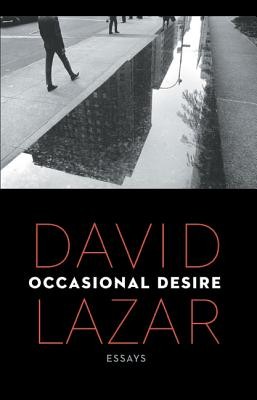
- We will send in 10–14 business days.
- Author: David Lazar
- Publisher: University of Nebraska Press
- ISBN-10: 0803246382
- ISBN-13: 9780803246386
- Format: 14.3 x 21.6 x 1.5 cm, minkšti viršeliai
- Language: English
- SAVE -10% with code: EXTRA
Reviews
Description
In his new collection of essays, Occasional Desire, David Lazar meditates on random violence and vanished phone booths, on the excessive relationship to jewelry that links Kobe Bryant and Elizabeth Taylor, on Hitchcock, Francis Bacon, and M. F. K. Fisher. He explores, in his concentrically self-aware, amused, and ironic voice, what it means to be occasionally aware that we are surviving by our wits, and that our desires, ulterior or obvious, are what keep us alive. Lazar also turns his attention on the essay itself, affording us a three-dimensional look at the craft and the art of reading and writing a literary form that maps the world as it charts the peregrinations of the mind.
Lazar is especially interested in the trappings of memory, the trapdoors of memory, the way we gild or codify, select, soften, and self-delude ourselves based on our understanding of the past. His own process of selection and reflection reminds us of how far this literary form can take us, bound only by the limits of desire and imagination.
EXTRA 10 % discount with code: EXTRA
The promotion ends in 21d.04:29:02
The discount code is valid when purchasing from 10 €. Discounts do not stack.
- Author: David Lazar
- Publisher: University of Nebraska Press
- ISBN-10: 0803246382
- ISBN-13: 9780803246386
- Format: 14.3 x 21.6 x 1.5 cm, minkšti viršeliai
- Language: English English
In his new collection of essays, Occasional Desire, David Lazar meditates on random violence and vanished phone booths, on the excessive relationship to jewelry that links Kobe Bryant and Elizabeth Taylor, on Hitchcock, Francis Bacon, and M. F. K. Fisher. He explores, in his concentrically self-aware, amused, and ironic voice, what it means to be occasionally aware that we are surviving by our wits, and that our desires, ulterior or obvious, are what keep us alive. Lazar also turns his attention on the essay itself, affording us a three-dimensional look at the craft and the art of reading and writing a literary form that maps the world as it charts the peregrinations of the mind.
Lazar is especially interested in the trappings of memory, the trapdoors of memory, the way we gild or codify, select, soften, and self-delude ourselves based on our understanding of the past. His own process of selection and reflection reminds us of how far this literary form can take us, bound only by the limits of desire and imagination.


Reviews